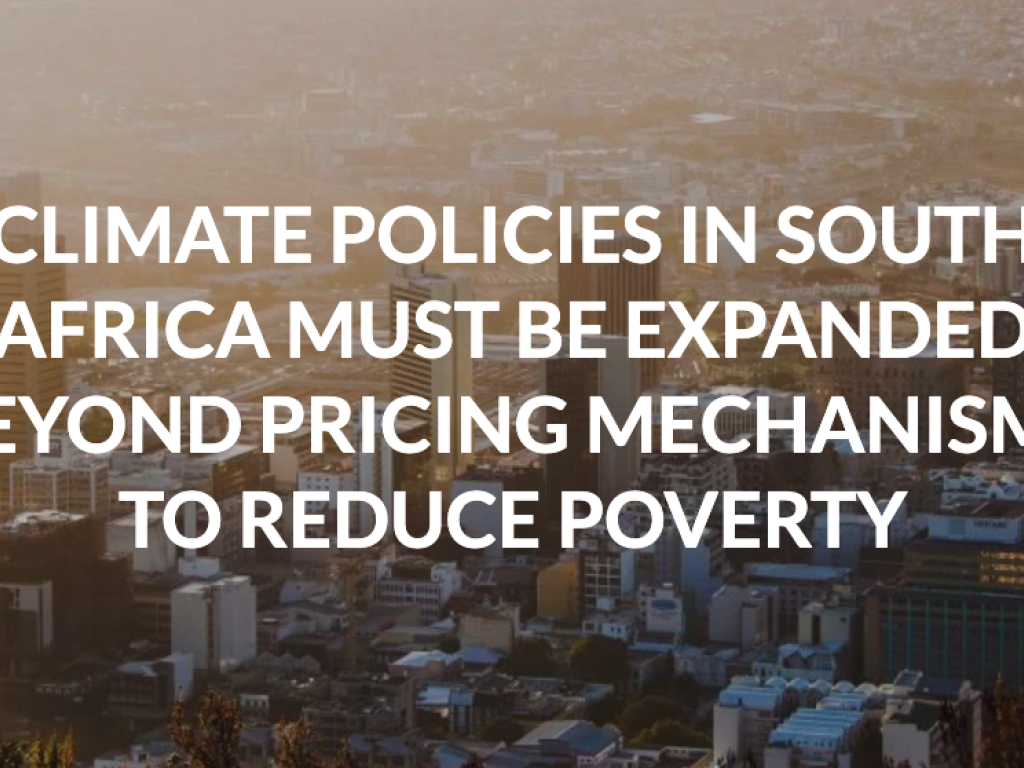In case you wondered why there is still no price on carbon in South Africa

Carbon pricing mechanisms as measures of income redistribution won’t do the trick alone in South Africa. Pricing mechanisms create little immediate gains and fierce distributional conflicts where the perceived losses of the rich outweigh the government’s implementation power accompanied by fragile coalitions of civil society who argue for the public benefits of a cool climate. The poor remain marginally represented in carbon pricing policy negotiations. Concerns about poverty mainly appear in the discourse used by predominantly richer actors to elevate their interests to issues of public interest.
This finding opposes the assumption of competing objectives between emissions and poverty reduction, which we can often observe in the international climate negotiations. Yet South African actors frequently use discourse that relates to potentially competing objectives between emissions reductions, competitiveness, jobs, poverty reduction and economic welfare.
Renewable energy technologies, in turn, create potential gains for larger groups of actors who strengthen the coalition of supporters against the opponents interested in nourishing their fossil fuel based operations. Renewable energy technologies can create gains for everyone, if successfully managed towards this goal.
A new paper, published in the journal Climate Policy, analyses power relations between the political actors who engage in coalitions negotiating South Africa’s main climate policies: the carbon tax, the carbon budget and the renewable energy program. A discourse network analysis shows who is involved in the national climate policy arena, in support and in opposition of the respective policies. The networks also show the arguments these actors use to make their case for or against specific climate policy measures.
South Africa is an interesting case, as its per capita emissions equal those of industrialised economies such as Germany, but then translate into the GDP of an upper middle income country with large parts of the population living in poverty.
Stumbling blocks towards low carbon and inclusive economic development in South Africa can be found in unbalanced coalitions between the conflicted state actors in the grip of fossil fuel lobbies and international commitments. The departments of finance and environmental affairs, along with support from NGOs and academia, face opposition from small lobbies of powerful businesses whose interests in sustaining their fossil fuel hungry operations intertwine with like-minded branches of the state and cause major conflicts of interests within the government. These power imbalances create structural impediments that hinder institutional change towards low carbon and inclusive economic development in South Africa, sustainably.
The coalitions of opponents fear significant financial losses and have managed to delay the implementation of carbon pricing instruments in South African climate policies for years.
The influx of renewable energy technology into a largely coal and nuclear powered economy has also created distributional conflicts which have shaped coalitions in support and opposition. The structure of these coalitions, however, are bigger, more diverse and more balanced as they have attracted interest from the international renewable energy industries and international and local financial sectors.
A successfully managed renewable energy programme has started to transform a coal- and nuclear-powered electricity sector towards integrating sustainable energy technologies. The programme has created gains for international and local industries and added to the country’s security in electricity supply. Gains for local and international industries have significantly strengthened the coalition of support and broadened the policy arena, which is essential to break the deadlock that we can observe in the small coalitions in the carbon pricing negotiations.
The renewable energy programme has created competition between the different energy industries and respective governmental actors who fear relevance and financial loss as they perceive incentives shift benefits from the existing coal and nuclear infrastructures, towards clean alternative technologies, despite them paying for themselves. The structure of the program has allowed independent power producers (IPPs) to generate electricity for the first time in the history of the country. The avenue of independent producers in South Africa’s electricity sector created intergovernmental opposition to the programme, beyond renewable energy. The roles of the IPPs sparks larger political and ideological battles about the privatisation of the energy sector.
Sustaining the renewable energy programme requires management at the highest political levels. It will be essential to expand the programme and the benefits of renewable energy technologies beyond the current incentive structure. Expanding the programme is essential to change the perception of renewable energy constraining rather than adding to the much needed security in electricity supply to sustain economic growth and to reduce emissions simultaneously.
This blog was originally published by climate strategies. Read the research paper here
